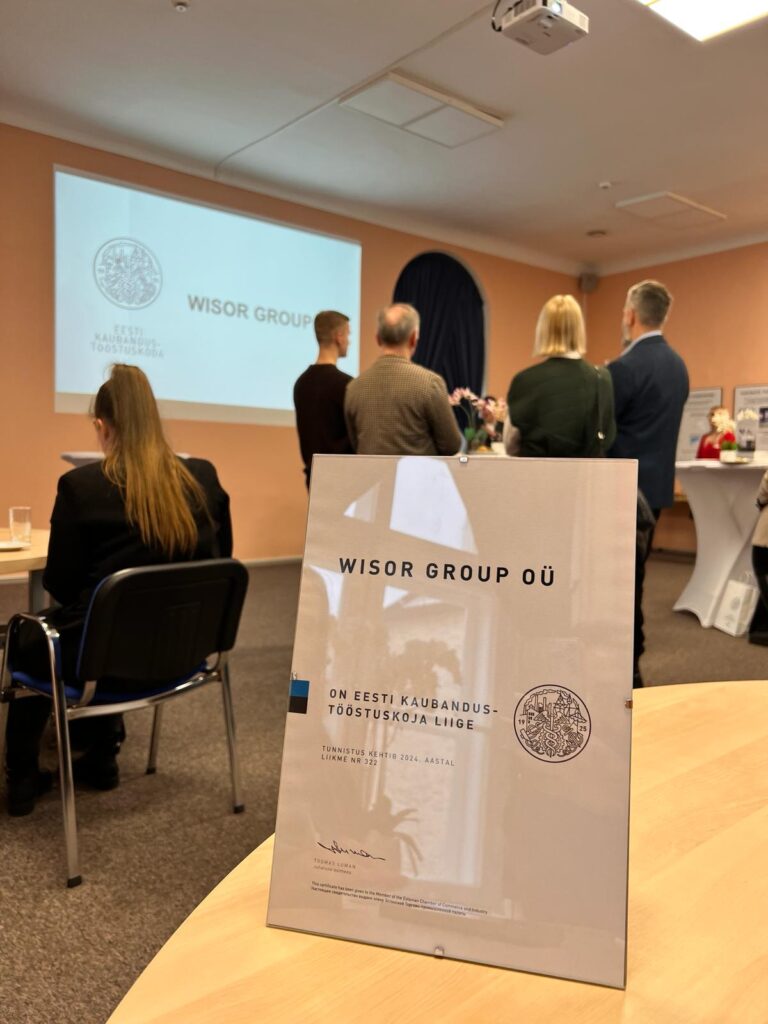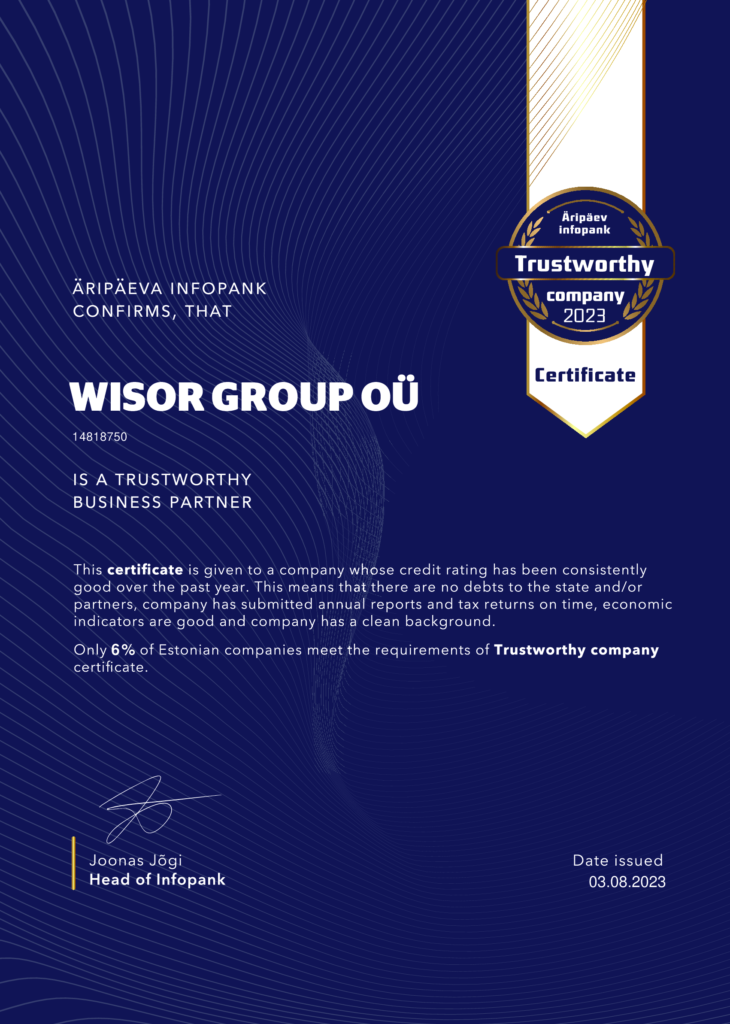In the dynamic landscape of business, understanding the full spectrum of your company's lifecycle is essential. This includes being well-informed about the processes of company liquidation and merger. While these might not be the most appealing subjects, having a comprehensive grasp of the processes, requirements, and associated costs is crucial for effective decision-making.
In this article, we will provide a detailed exploration of Estonian company liquidation, including the recent change allowing for simple applications for deletion in the case of dormant companies, as well as the intriguing option of company liquidation via merger, especially when merging with a shareholder who is a physical person. If you are interested, feel free to visit our liquidation service page for an overview of all services.
Understanding Estonian Company Liquidation
Company liquidation is a formal process that involves winding up a business entity. In Estonia, the Commercial Code outlines the steps and requirements for a seamless transition from active operations to dissolution. Whether your company has naturally reached the end of its journey or you're considering a strategic move, understanding this process is essential.
The Standard Estonian Company Liquidation Process
- Shareholder Resolution: The process begins with the company's shareholders drafting a resolution to initiate liquidation. This decision necessitates shareholder approval.
- Appointment of a Liquidator: A liquidator, either from the management board or an external professional, is appointed to oversee the liquidation process. It is mandatory that at least one appointed liquidator is an Estonian resident. In the usual liquidation process there are generally two liquidators: one from the board and the other a consultant/lawyer from our side.
- Public Notice: A notice regarding the liquidation is published in the official publication Ametlikud Teadaanded and potentially on the company's website.
- Inventory and Valuation: A comprehensive inventory of the company's assets and liabilities is conducted, followed by their valuation. This step provides clarity on the company's financial standing.
- Settlement with Creditors: All outstanding debts and obligations to creditors are settled within a specified period. Creditors are given the opportunity to submit their claims.
- Distribution of Assets: After settling liabilities, remaining assets are distributed among shareholders based on their ownership stakes.
- Tax Obligations: Settling all tax obligations, including income tax and VAT, is paramount prior to the completion of the liquidation process.
- Submission of Final Reports: The liquidator prepares a final report, incorporating the inventory, valuation, and financial statements. This report is then submitted to the Commercial Register.
- Application for Deletion: Following the submission of a liquidation report, an auditor's report (if required), and other necessary documents, the company can be deleted from the Commercial Register based on the relevant application.
Notably, our team of legal professionals has ingeniously streamlined the standard liquidation process, ensuring operational efficiency and minimising administrative complexities by understanding all accounting aspects beforehand and therefore ensuring the uninterrupted flow of the whole liquidation process.
The anticipated timeline for the comprehensive company liquidation ending with final deletion is 8 months for regular liquidation and 4 months for liquidation via merger.
Our clients have to provide us with all relevant accounting documents, visit the notary once (in their home country) and then let us take care of the rest. In case all the related persons have Estonian ID cards or E-residency cards, then the whole process can be done with just digitally signing the documents prepared by us.
Digital Application for Deletion for Dormant Companies
A notable recent change in the Estonian company liquidation process concerns dormant companies. If a company is dormant, meaning it has had no economic activity whatsoever, it is now possible to make an application (either digital or legalised) to the Commercial Register with a request for deletion. This streamlined approach aims to simplify the process for such cases, minimising administrative burdens. After submitting the relevant application to the registry it will be necessary to wait for the tax office approval regarding the deletion. After the tax office has provided the relevant approval the company will be deleted. Generally this takes between 2 weeks to 2 months to complete.
Estonian Company Liquidation via Merger with a Sole Shareholder of the Company
An intriguing alternative to traditional liquidation is to do it via merger. You may follow our company liquidation service page for the short description of the process. This process involves merging the liquidating company with the sole shareholder of the company, effectively transferring its assets, liabilities to the physical person. This option offers several advantages:
- Asset Utilisation: The assets and liabilities of the liquidating company are joined with the shareholder.
- Time efficient: The company will be deleted within approx. 3-4 months.
The Process of Estonian Company Liquidation via Merger with the Sole Shareholder of the Company
1. Shareholder resolution: The company's management and shareholder decide to pursue liquidation via merger with the physical person shareholder.
2. Shareholder Agreement: A notarial agreement is formulated between the company and the physical person shareholder, detailing the terms and conditions of the merger. The agreement encompasses the transfer of assets, liabilities, and ongoing responsibilities.
3. Public Notice: A notice regarding the merger is published in the official publication Ametlikud Teadaanded.
3. Valuation and Asset Transfer: Company assets and liabilities are valued in accordance with prevailing industry standards. Preparation is made for transferring assets to the physical person shareholder's entity, alongside the assumption of liabilities.
4. Formation of Accounting Documents: Essential legal documents, encompassing the merger agreement and valuation reports, are prepared and submitted to relevant authorities. Outstanding company obligations, including debts and liabilities, are settled before finalizing the merger.
5. Dissolution of Original Company: Upon successful completion of the merger, the original company undergoes formal dissolution, effectively removing its entity from records. For this the final accounting documents as well as the deletion application is submitted to the Commercial Register. Read more about the dissolution of your Estonian company.
Estonian Company Liquidation Process Pricing and Costs
The expenses associated with liquidating a company or executing a merger in Estonia can vary based on factors like financial complexity, outstanding obligations, and professional involvement. Consulting with our experienced legal advisors is crucial for obtaining accurate cost estimates tailored to your unique situation.
We've also created straightforward packages for each liquidation option, drawing from our expertise. These packages are designed to match common scenarios and simplify the process. This means you'll have clear options that suit your situation, ensuring a smoother experience.
To Conclude Estonian Company Liquidation
Estonian company liquidation and merger might appear complicated processes, yet with expert planning and support from local professionals, they can be managed effectively. By understanding the intricacies and costs of these processes, along with recent changes like simplified deletion applications for dormant companies, you are empowered to make strategic decisions about the future of your business. Collaborating with a reputable corporate service provider simplifies the procedures and ensures compliance with legal requirements, facilitating a seamless transition.
Please also see the FAQ regarding liquidation on our services website.
In case of any questions or inquiries about the liquidation, please feel free to send us an inquiry.
Frequently Asked Questions (FAQ) About Estonian Company Liquidation
1. What is company liquidation in Estonia?
Company liquidation refers to the formal process of winding up a company's affairs and operations. It involves the orderly distribution of assets, settling of liabilities, and ultimately, the dissolution (deletion) of the company from the Commercial Register.
2. Why would a company opt for liquidation?
Companies choose liquidation for various reasons, including financial distress, cessation of operations, compliance with regulatory requirements, or as a strategic decision to end the company's existence.
3. What are the different types of company liquidation in Estonia?
There are two main types of liquidation: voluntary liquidation, initiated by the company's shareholders, and compulsory liquidation, initiated by external parties such as creditors or regulatory authorities.
When talking about voluntary liquidation in Estonia, there are different options:
1. Regular liquidation
2. Simplified deletion (suitable only for completely dormant companies)
3. Liquidation via merger (merging the company with the physical person shareholder)
4. How long does the company liquidation process typically take in Estonia?
The duration of the liquidation process varies depending on factors such as the complexity of the company's financial affairs and the efficiency of the chosen process. Generally, the process can take several months to complete. Please see our liquidation options and timeframes.
5. What is the role of a liquidator?
A liquidator is responsible for overseeing the entire liquidation process. Their duties include valuing assets, settling debts, distributing assets to stakeholders, preparing reports, and ensuring compliance with legal requirements. Our appointed liquidators will get necessary information from the company representatives and shareholders and work with them closely in order to ensure a smooth liquidation process.
6. What is the role of the shareholders in liquidation?
Shareholders play a crucial role in initiating the liquidation process by passing a resolution to wind up the company. They may also be entitled to receive a share of the company's remaining assets after settling liabilities. In case of liquidation via merger with a shareholder, the shareholder takes on all the company's assets and liabilities.
7. What happens to the company's assets and liabilities during liquidation?
Assets are valued and sold, with the proceeds used to settle the company's liabilities. Any remaining assets are then distributed among shareholders according to their ownership stakes. In case of liquidation via merger with a shareholder, the shareholder takes on all the company's assets and liabilities.
8. Can a company continue operations during liquidation in Estonia?
In most cases, a company ceases its regular operations during the liquidation process. However, some limited operations may be necessary to facilitate the liquidation itself. Our liquidation process will generally start only after the company has ceased its operations and ended all relationships, as well as closed the bank accounts.
9. What are the Estonian tax implications of company liquidation?
Liquidation can have tax implications, including income tax and VAT. All tax obligations should be settled before the process is completed. You will be guided in detail by the accountant during the process.
10. What is the significance of public notices during company liquidation in Estonia?
Public notices about the liquidation are published in the Estonian Official Publications to inform creditors, stakeholders, and the public about the company's status (so that they can make their claims, if needed). It's a crucial step to ensure transparency and compliance with legal requirements. In Estonia public notices are published in Ametlikud Teadaanded.
11. Can an Estonian dormant company go through liquidation?
Yes, even dormant companies can undergo a regular liquidation process.
However, there is a simplified deletion process (without liquidation) for dormant companies in Estonia. It is done by signing an application (either digitally or legalised) to the Commercial Register and getting Tax Office approval for deletion of the company.
12. What is the difference between company liquidation and bankruptcy in Estonia?
Liquidation is the process of winding up a company's operations, whereas bankruptcy typically applies to individuals and companies who are unable to repay their debts. Bankruptcy involves a legal declaration of insolvency.
13. Can a company liquidation process in Estonia be reversed once initiated?
In certain cases, it might be possible to reverse a liquidation process if shareholders decide to continue the company's operations. However, reversing the process can be legally complex and requires an application to the court. In case you require a reversal of liquidation, please contact our legal advisors.
14. How can professional corporate service providers assist with the company liquidation process in Estonia?
Experienced corporate service providers can guide you through the intricate process, ensuring compliance with legal requirements, accurate valuations, and a smoother overall transition. The timely filings in the liquidation process are essential to ensure the success of the liquidation and our advisors are able to keep track of all necessary filings and deadlines.
15. Are there any alternatives to company liquidation in Estonia?
Yes, we also offer purchasing your company fully with the intention of liquidating it later. Meaning, that you will be free of your company from the moment of sales. There are certain requirements to be met before the sales, however this can be in some cases the most suitable option for some clients. Look for further information on company purchase fully.
Remember, every company's situation is unique, and seeking professional advice is essential for making well-informed decisions regarding company liquidation.





